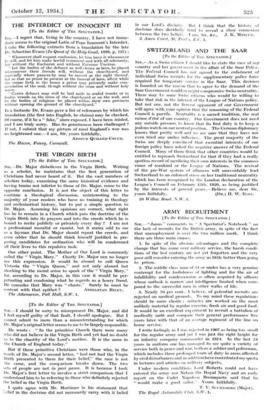ARMY RECRUITMENT
[To the Editor Of TI1E SPECTATOR.] • SIR,—"Janus comments in A Spectator's Notebook" on the lack of recruits for the British army; in spite of the fact that unemployment is over the two million mark. I think there are three main causes.
1. In spite of the obvious advantages and the complete change that has come over military service, the harsh condi- tions of the last century are not yet forgotten and the very poor still consider entering the army as little better than going to prison.
2. The middle class man of 3-1 or under has a very genuine contempt for the foolishness of fighting and for the air of infallibility. and condescension so often acquired by officers whose outlook is narrow and intelligence limited when coin- pared to the successful men in other walks of life.
3. Nearly 70 per cent.. I believe, of potential recruits arc rejected on medical grounds. To my mind these regulations should be more elastic: miracles are worked on the most -unlikely material by regular exercise, fresh air and good food. It would be an excellent experiment to recruit a battalion: of medically unfit and compare their general performance fiye years later with that of an average regiment of the line on home service.
I write feelingly as I was rejected in 1907 as being too small for the regular army and yet I was just the right height for an infantry company commander in 1914. In the last 24 years in uniform one has managed to see quite a variety of service both in peace and war, both as a soldier and policeman, which includes three prolonged tours of duty in areas affected by civil disturbances and in addition have contributed my quota in lectures and articles on military subjects.
Under modern conditions Lord Roberts could not have entered the army nor Nelson the Royal Navy and an early report on the Cadet Napoleon Buonaparte said that he would make a good sailor.”—Yours faithfully,














































 Previous page
Previous page